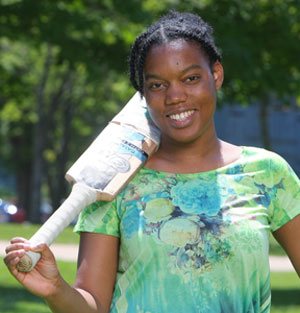 |
| Kewoba Carter wrote about the sport of cricket to win¬Ýthe Mushkat Memorial Essay competition. (Nick Pearce Photo) |
Cricket in the Caribbean has always been more than “just a game,” says Kenowba Carter. It’s a passion, a unifying force, a catalyst for independence, a metaphor for social history.
“In the Caribbean, cricket is taken very, very seriously,” says Ms. Carter, 23, an international student from the tiny island of Dominica.
The Dal student is doing a combined honours degree in international development studies and English. On the recommendation of Professor Owen Willis, she recently seized a chance to bring her two interests together by entering an ¬ÝThe Mushkat Memorial Essay ‚Äúpromotes academic excellence and scholarly research into the meaning and principles that define ‚Äòtolerance,‚Äô‚Äù according to FASS.
Cricket, after all, seemed like an ideal topic for exploration. It’s the only sport that the island nations all cooperate to field a team and compete internationally. Affectionately known as the “Windies,” the West Indies Cricket Team is comprised of players from countries such as Barbados, Guyana, Jamaica, Trinidad, Antigua and smaller island nations too, like Ms. Carter’s native Dominica. The Windies are both a men’s and a women’s team.
“With cricket, everyone is united,” she says, with a smile. “Let’s beat England! Let’s beat Australia! That’s something we can all agree on.”
Struggle for independence
The team gives Caribbean people a chance to excel on an international stage and a sense of pride. But more than that, says Ms. Carter, cricket was instrumental in overcoming racial tensions during the colonial era as “people of colour and people of European ancestry could play together, have fun together and learn from each other.” At a time when the islands were struggling for independence, cricket showed, “hey, if they can beat us at cricket, at our own game, our own gentleman’s game, then yes, they can govern themselves too.”
The history of the cricket in the Caribbean stretches back to the 18th and 19th centuries, when the people “would watch their white masters play,” explains Ms. Carter. After awhile, they were invited to play along. In the 1890s, the first combined island team was formed and played visiting English teams.
With a warm-up in the 1960s, the Windies dominated the world stage in the 1970s through to the mid-1990s. At the first Cricket World Cup held in England in 1975, the Prudential Cup was hoisted by West Indies captain Clive Lloyd. The victory was huge: the Windies had beaten the English at their own game in their own backyard—at the storied Lord’s Cricket Ground in London.
Fun atmosphere
Going to a cricket match in Dominica is a lot of fun, says Ms. Carter. Kids learn how to play the bat-and-ball sport in school and are familiar with its complicated set of rules. Played with two teams of 11 players, cricket matches can last from several hours to several days. Between the runs and breaks, calypso or reggae music blasts out of loud speakers, and there’s a laidback, party atmosphere.
With a population of approximately 70,000 people, Dominica opened a major cricket ground in 2007. The Windsor Park Stadium has a seating capacity of 12,000.
“As a kid, I loved to go to the gardens with my parents; there was such a sense of excitement,” says Ms. Carter. “If you couldn’t go to the match, then you’d listen on the radio.”
For her essay on cricket, Ms. Carter ended up winning the Mushkat competition and its $4,000 prize. After living for Halifax for the past three years, she’ll use the money to escape a Canadian winter, albeit briefly, and fly home for Christmas. Sebastien Labelle won the Irvin and Jeanne Glovin Award, which also comes with $4,000 in prize money.
LINK:
